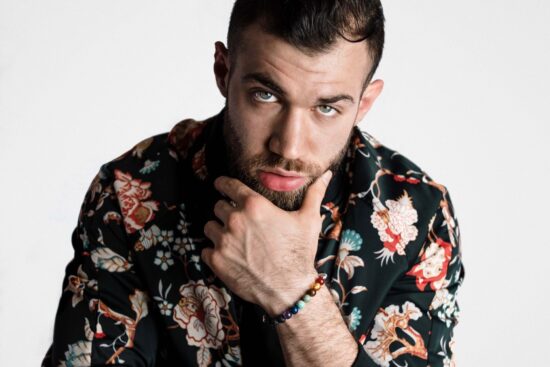The American-born, Berlin-based composer Dustin O’Halloran has fast become known for his captivating, heart-breaking sound, which has provided the score for films such as Sofia Coppola’s ‘Marie Antoinette’ and Drake Doremus’ ‘Like Crazy’ as well as the award-winning theme track for Jill Soloway’s acclaimed television series ‘Transparent’.
But what are the musicians’ own priorities when it comes to sound, and to the listening experience in general? For this feature, we teamed up with Moshi, whose Avanti On-Ear headphones match impeccable sound quality with timeless design for an elevated listening experience. Dropping by O’Halloran’s Berlin studio, we learnt what’s going through his mind whilst performing, how he chooses his headphones, and which three songs break his heart time and time again.
Doing your music justice with words is a tall order, but if you had to describe the style of your sound to someone who wasn’t yet familiar with it, how would you define it?
“I am always trying to get to a place of honesty.”Well, I think I am always trying to get to a place of honesty and to the point where there is only what is necessary. Obviously there are a lot of emotional aspects to the music. It is hard to describe, but I think lately I have been working with a lot of piano and strings. And slowly I have been weaving in electronics. It is something that I have started to work more on and I have just finished my first all electronic score with Sascha Ring of Apparat, the German electronic musician. We did a science fiction movie called ‘Equals’ with Kristen Stewart together. I think describing the instruments is always a good way to understand a little bit where the music is, but I think it’s about a lot of mood and space and minimalism and emotion. It’s instrumental, obviously. [Laughs].


You taught yourself piano from age seven. What are the biggest challenges and freedoms that come with being an autodidact?
I mean, to be able to make music in the way you want to is the biggest freedom. I think the hardest part is actually sometimes living that life which means a lot sacrifice, a lot of traveling, a lot of time spent alone and when everyone is out enjoying their summer. It’s a lot more work to do it than people realize. You have to sacrifice a lot.
What’s going through your mind when performing live?
“Ultimately music is a language that speaks to the subconscious.”Did I leave the oven on…? Is my laundry finished…? … No [laughs] It changes. I think when you write a piece of music, there are things in your mind, and there are feelings and emotions related to those things. But as you continue to play it, it changes and I think probably the best place to be is when you get to a more kind of meditative state with the music, where you are not thinking so much and you are just in it. If I am actually thinking of too many things it is usually not so good because I am not fully present with the music. Ultimately, music is a language that speaks to the subconscious, I think. If I am having really conscious thoughts I am too distracted.








Composing for film is a central tenet of what you do, having composed the scores for the likes of Sofia Coppola’s Marie Antoinette and Like Crazy as well as the award-winning theme tune for Transparent. Can you fill us in on your process when composing with visuals in mind?
“Most of the projects that I do for film they come through the directors who really like my records.”I think I have been really lucky because most of the projects that I do for film they come through the directors who really like my records, my solo records. So I have been really fortunate that that is the starting point of where I usually begin and then you have to adjust and work, to find a way into it as well. I think that it is always this kinda point where they are looking for something that I already have in my music and then sometimes I start from the script and just writing ideas from the script, which is really nice.
And slowly when the visuals come I start to adjust to the picture or we would just put things into the film to see if its working, if the mood is working. But sometimes I get a picture and it will be edited already and you just have to start working with the picture. When I do that the picture is really driving, and that’s a different way to write. It is not always my favorite because it’s more like a classic film score thing.
You don’t feel as free when starting on your own because I think you always feel informed by the picture, sometimes they have a temporary score which they get really into and you have to try to put that out of your head and get into a different space. But most of the time I try to think about the story, think about the emotions, think about how I can relate to it and if I can just make music for a while without any picture then put it slowly into the pictures, that’s the best that I like to work.
What’s your ideal setting to consume music for pleasure or relaxation in?
“My favorite thing is to put just one record on and just let it be that one record for the night.”Well, at home I just have a record player and I really like that. I think because I work on music everyday and so much of the day it is sometimes hard to have space to listen to music. If you put Spotify or the radio on, the music kind of just keeps going and I like the records because you have to sort of focus more and you just decide one thing and you listen to it. Lately my favorite thing is to put just one record on and just let it be that one record for the night. And I will listen to it twice maybe. So I am not changing the music that much and so I give something just one big good listen and then let it rest.







What do you look for when choosing headphones, in terms of acoustics, comfort and style?
“I always look for headphones that just have a really smooth dynamic response.”For my studio I always look for headphones that just have a really smooth dynamic response and they don’t have a lot of extra base or extra highs. But I also try to find ones they do have a really good base response, but then I have to find headphones also that don’t bleed when I am recording, if I am listening to something playback. When I am on the road then I like headphones which are a little bit more colored, maybe they have a little bit more base than usual or they can be more colored and if they are small and have a nice minimal design. Lately I’ve been using my Moshi, Avanti headphones for traveling and listening to mixes. I usually wear headphones for a long time and these are super comfortable and my ears don’t get tired. The sound is great for traveling when I’m out of my studio and like this vintage look they have.
What should a pair of headphones offer for music listened to on the go?
I like headphones that cut out the sound. The external sound. Because when I am traveling on the plane it just takes everything and it kinda helps me to get into my own space, so I like that.
What is the latest project you have been working on recently?
There are a few things… There is a film that coming out in November. It is called ‘Lion’ and we are going to premiere at the Toronto Film Festival in about a week. And it’s directed by Garth Davis his debut film. It is a very beautiful story based on a book, “The Long Way Home” about this Indian boy who gets lost and eventually adopted by a Australian family. And it has Nicole Kidman, Rooney Mara and Dev Patel, and I did it with Hauschka, a German composer. I think it is my favorite film I worked on. A beautiful film.


Is it the first time you worked with someone else?
“It has been a really busy seven months, and everything is coming out at the same time.”Well this year it’s interesting. I mostly worked on films by myself but this year I did two films and each was a collaboration. The other film that is coming out in November – there are two coming out. It’s a French film called Iris and its directed by Jalil Lespert who did Yves Saint Laurent a couple of years ago. I did that as ‘A Winged Victory For The Sullen’, which is the project that I have with Adam Wiltzie. So him and I did it as our band name I guess. It’s more an electronic score. A lot of electronics with a string orchestra and it’s a bit of a sexual thriller. It has Charlotte Le Bon and Jalil Lespert also acts in it and the third actor is great his name is Romain Duris. And then there is the third season of Transparent that’s about to come out in a month. So it has been a really busy seven months, and everything is coming out at the same time. I’m also currently working on a new solo album.
Which three songs break your heart over and over again each time you listen to them ?
I have to mention my friend – well, my partner – in the band Sara Love, with whom I am part of the band. She did a solo record and made a song called “Fountain”. That one always breaks my heart. And um, what else… Leonard Cohen’s “That’s no way to say goodbye”. Um… Another heartbreaker. Give me a moment (laughs). That’s a tall demand – the heartbreaker songs. What really gets me is Dimitri Shostakovich, I think it’s the Prelude No 1 [checks phone]…Yes, Op. 87 No.1.
“What really gets me is Dimitri Shostakovich, I think it’s the Prelude No 1.”
– In collaboration with Moshi –
All images © Clemens Poloczek, taken exclusively for iGNANT. Interview by Clara Renner, questions and editing by Anna Dorothea Ker.






Leave a Reply